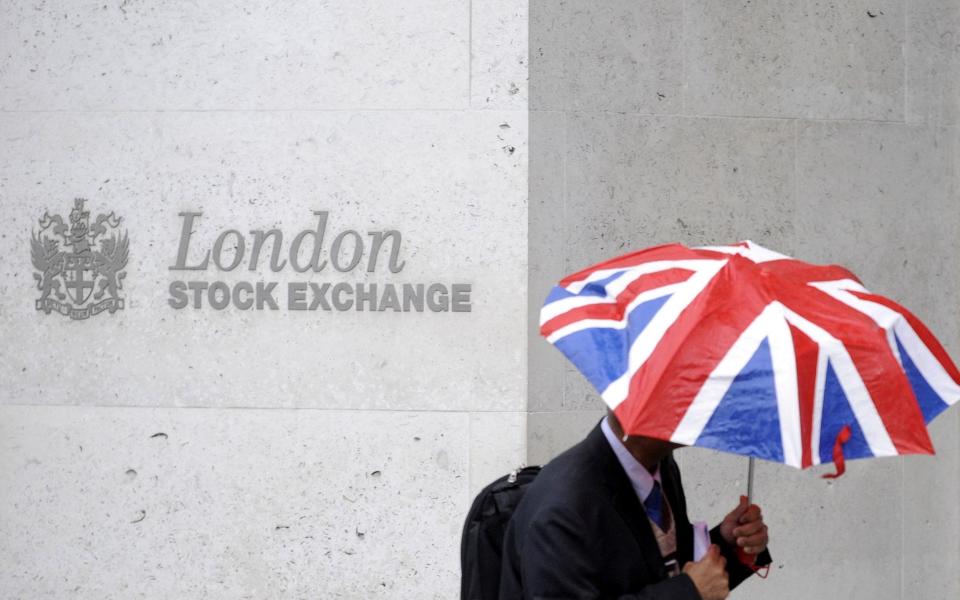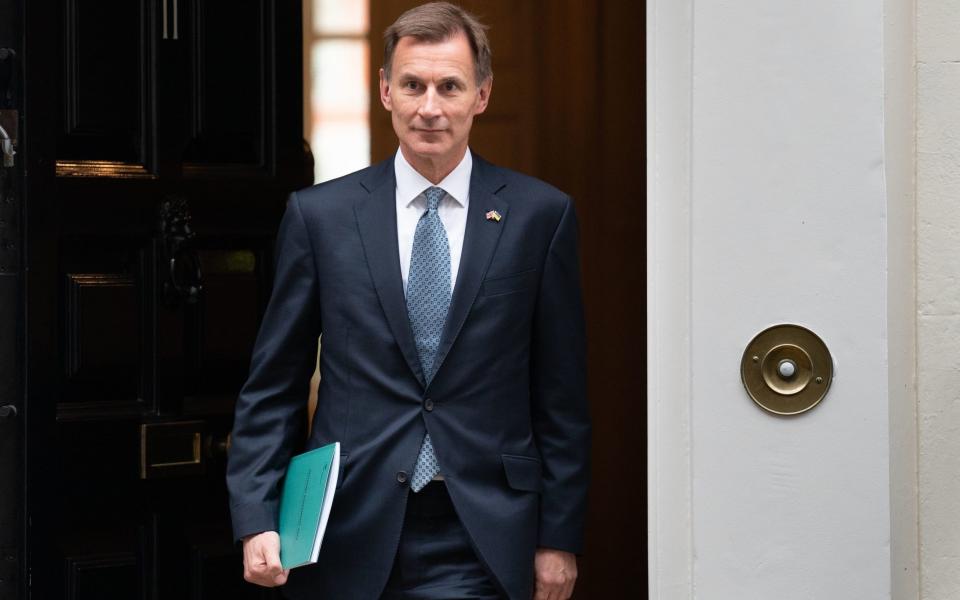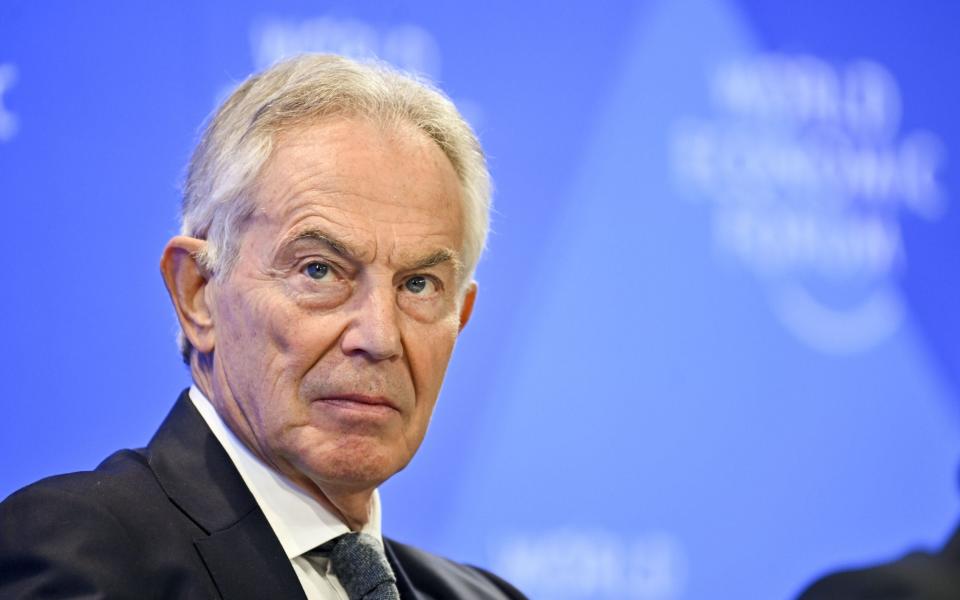London has given up on risk and cannot compete with New York, warns City chief

Britain's failure to back "risk takers" means London is unable to compete with New York, one of the City's most senior executives has warned, as three blue-chip businesses prepare to list on Wall Street.
Peter Harrison, head of the fund manager Schroders, spoke out as construction behemoth CRH announced it was leaving the London Stock Exchange for New York on the same day that gambling business Flutter said it could also shift its primary listing.
It follows a decision earlier this week by the owners of UK tech crown jewel Arm to float the company in America.
The plans triggered accusations that a wave of reform in London had fallen flat, while green tax breaks and a spending spree under US President Joe Biden prove an irresistible lure.
Mr Harrison said that more businesses will leave because of the Government’s sluggish efforts to make Britain more appealing.
He said: “We’ve had Jonathan Hill’s review on primary markets. We’ve had Mark Austin’s review on secondary markets. But they haven’t yet been implemented.
“There is a lot in the pipe, but it needs to get done quickly. It needs to take place in an atmosphere of forward-leaning and a willingness to take risk – because if you don’t take risk, you don’t get a return.
“We can bolt everything down, make sure everything is absolutely squeaky solid. But if there is no risk-taking then companies will say they want to go and be listed somewhere where there is risk-taking – and where there is a return on capital.”
Mr Harrison’s intervention came as CRH announced plans to move its primary listing to New York. Shares jumped 8.5pc in response, valuing the FTSE 100 constituent at £32bn.

Flutter, the world’s biggest listed gambling operator and another member of the blue-chip index, said it was open to switching to the US after last month unveiling plans for a secondary listing in America.
Meanwhile Cambridge-based Arm – which was in the FTSE 100 before being taken private in 2016 – decided on a New York listing on Wednesday.
President Biden's $738bn (£618bn) Inflation Reduction Act (IRA) offers a host of tax incentives to companies working in clean energy, while an additional $40bn has been set aside for microchip makers.
Setting out its plan to shift its primary listing to the US, CRH said: “Our exposure to [the US] is likely to increase further driven by substantial increases in infrastructure funding, a renewed drive for the onshoring of manufacturing activity and significant levels of under-build in the residential construction market.”
The company, which is headquartered in Ireland, has a secondary listing in Dublin.
Asked about CRH’s proposed move, David Schwimmer, chief executive of the London Stock Exchange Group, shrugged off concerns and said: “If companies are going to make decisions when most of their business is in the US, that sort of is what it is.
“We will look forward to continuing to attract companies to this market and London continues to be a great listing venue.”
He praised the Government's City deregulation drive as a step towards making London more attractive.
However, Mr Harrison suggested that reforms must be speeded up– particularly a long-awaited post-Brexit change to the Solvency II rules that limit how pension money can be spent.
He said: “Between 10pc and 13pc of UK pension fund assets are invested in UK equities. A very low number.
“[We] have no pool of domestic capital. We have not got any positive dynamic that is saying: ‘this is why it is going to change’.
“We’ve got the best medtech, edtech, fintech entrepreneurs on the planet. But what we need to do is create a pool of patient capital to invest in them early. So as they grow they list here not abroad.”

Arm's decision to opt for the US is a significant blow for the Treasury, which had courted a London listing for the chipmaker but is now understood to have conceded that it is powerless to either attract or retain large companies that are dazzled by the US.
Whitehall sources insisted that the exodus was “a reflection of their strength [rather than] than a reflection of our weakness”.
They added: “Listing reforms will help, but the US market is fundamentally more liquid."
Arm has left the door open to a secondary listing in Britain if the Financial Conduct Authority relaxes stock market rules by easing requirements surrounding related-party transactions, sources said.
The requirements have been seen as a barrier to the Cambridge technology giant listing in Britain owing to the number of relationships it has with companies owned by its parent, the Japanese conglomerate SoftBank.
The FCA is believed to be considering putting forward the changes in a consultation in the coming months, after gathering feedback to a discussion paper it published last year.
Earlier this week the Financial Times reported that Shell executives had explored moving Britain’s biggest listed company to the US before concluding it was better to stay put.
Is the London stock market really dead?
By Matt Oliver, Simon Foy and Oliver Gill
Asked why companies are fleeing the London Stock Exchange in favour of the US, David Schwimmer put a brave face on.
“If companies are going to make decisions when most of their business is in the US, that sort of is what it is,” the London Stock Exchange Group chief executive said on Thursday.
“London continues to be a great listing venue.”
Schwimmer was speaking just after CRH, the world’s largest building group, had revealed plans to ditch London for New York, depriving the City of a £30bn behemoth.
Hours earlier it was reported that Arm, the Cambridge microchip pioneer, was also headed to Wall Street, barely a fortnight after gambling giant Flutter said it too may switch its primary listing to the other side of the Atlantic.
Last year plumbing products maker Ferguson made the same switch and, earlier this week, it emerged that oil giant Shell had seriously considered a US listing before opting to stick with London.
Oliver Lazenby, a partner at Freshfields Bruckhaus Deringer who is advising Flutter, told Bloomberg he is “speaking to several other companies” who want to shift to New York.
The stream of businesses fleeing the London market threatens to become a flood. Meanwhile, there are scant examples of companies making the reverse trip and coming to Britain.

Among senior figures in finance, there is a general sense that London is losing its global competitiveness, weighed down by mountains of red tape and pension regulations that have slowly choked off vital sources of capital. Brexit uncertainty, too, has left British firms valued more cheaply than their foreign peers.
It raises the question of how much longer London will be able to call itself a world-class stock market – and whether it may be already too late to reverse the current slump.
Government ministers, City grandees, regulators and LSE itself have long grappled with how to make London more competitive. The issue has been given added urgency by the recent passage of Joe Biden’s colossal Inflation Reduction Act, which is spraying money at businesses like confetti and attracting more investment into the US.
Chancellor Jeremy Hunt’s recent announcement of the so-called Edinburgh Reforms is a first stab at fixing the problem. The new rules are aimed at bringing London listing requirements in line with peers and triggering a “Big Bang 2.0”.
But there is still a nagging sense of drift. Top investors have warned for years that London was losing its edge and the decline only seems to be accelerating.
Sir Paul Marshall, the chairman and co-founder of hedge fund Marshall Wace, claimed the City was in danger of becoming “a sort of Jurassic Park” in 2021, blaming penny-pinching fund managers for being more focused on income than innovation and growth.
He told the Telegraph: “This is a Europe-wide phenomenon and not confined to the UK.
“It reflects the very weak position of Europe in almost all the main growth industries of the future and the almost complete absence of a growth-oriented investor base.”
A major barrier to attracting dynamic businesses is the large amount of paperwork associated with being listed in London.
For example, rules for so-called premium listings in London – which companies need to qualify for FTSE indexes – say boards must disclose any transaction worth more than 5pc of their business, as well as issuing a detailed prospectus and holding a shareholder vote on the matter.
The onerous process takes months and costs a small fortune in advisory and legal fees.

There is no such requirement in the US, where a company’s audit committee can simply sign off on a transaction.
American companies are also exempt from the growing list of ESG (environmental, social and governance) reporting requirements that London-listed companies face.
Charles Howarth, a partner at City law firm CMS, says: “As a result, listings which should be natural fits for the London market are going to other markets.”
The UK currently boasts the highest number of “unicorns” — private companies worth $1bn or more – outside of the US and China. But one senior City figure fears they are simply being “fattened up in the UK, ready for the US to eat them”.
The Financial Conduct Authority is now looking at replacing Britain’s premium and standard listings with a single class that would allow companies to follow less stringent disclosure standards so long as they make this clear to investors.
Yet it is not just market structure that has left London lagging. Our risk-averse investors also discourage companies from choosing Britain.
Investors in the London market typically prefer “reliable, dividend-paying companies” to faster-growing ones that reinvest in their businesses, Howarth says. That contrasts with the attitude of US investors, where growth is king, and makes New York a more attractive destination for tech and bioscience businesses.
Britain’s risk-averse approach is clear in our pensions sector, which is the second largest in the world. Far less retirement cash is invested in equities than in other countries, with funds instead preferring bonds.
That in part reflects a tough regulatory clampdown that followed a series of high-profile savings scandals involving Robert Maxwell, Equitable Life and BHS under Sir Philip Green, to name a few.
However, Steve Webb, a former pensions minister and now partner at consultancy LCP, says the rules have made funds “excessively prudent”.
“We are making the case to the Government that it has gone too far,” he says.
The lack of pension fund money invested in the stock market leads to a smaller pool of available capital, which can make it more expensive for companies to raise money here compared to other markets.
Some international investors have also shunned the British market in the wake of Brexit and amid political uncertainty, compounding the problem.

All of these factors have led to a dearth of new listings in London in recent years and prompted some companies to quit Britain. The number of UK-listed companies has dropped by around two-fifths since the financial crisis and the London market accounted for only 5pc of global listings between 2015 and 2020.
At its peak in 2007, the London stock market was worth £3.6 trillion. Yet at close last night the market was worth £2.6 trillion. Over the same period the US stock market has doubled in size, according to Bloomberg data.
Late last year Paris overtook London as Europe’s biggest stock market in a blow to national pride.
A veteran advisor, who works with several major British companies, believes unlocking pensions could be a “one leap and we’re free opportunity” for reviving the market.
Sir Tony Blair and William Hague suggested in a recent report that Britain’s 5,300 final salary pension schemes be combined into 100 or so mega funds, each with a mandate to invest 25pc of funds into UK assets.
This could unleash a huge new flood of money to power Britain’s ambition to become a “science superpower”. City insiders say it will also be crucial to ensuring that innovative companies that are founded here can grow here rather than fleeing overseas.
However, some fear it may be too late. As the market shrinks, it becomes harder and harder to attract new listings and hang on to existing ones.
Schwimmer said departures from the LSE “tend to get a lot of focus” but said “there’s real opportunity to improve”.
Whether they are grasped is another question.

 Yahoo Finance
Yahoo Finance 